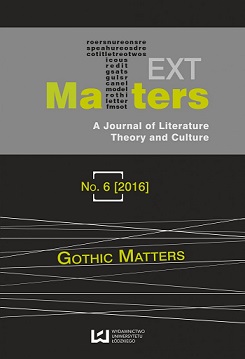On (Not) Being Milton: Tony Harrison’s Liminal Voice
DOI:
https://doi.org/10.1515/texmat-2016-0017Abstract
Tony Harrison’s poetry is rooted in the experience of a man who came out of the working class of Leeds and who, avowedly, became a poet and a stranger to his own community. As Harrison duly noted in one interview, from the moment he began his formal education at Leeds Grammar School, he has never felt fully at home in either the world of literature or the world of his working class background, preferring to continually transgress their boundaries and be subject to perpetual change.
The paper examines the relation between poetic identity, whose ongoing construction remains one of the most persistently reoccurring themes of Harrison’s work, and the liminal position occupied by the speaker of Harrison’s verse. In the context of the sociological thought of such scholars as Zygmunt Bauman and Stuart Hall, the following paper discusses the way in which the idea of being in-between operates in “On Not Being Milton,” an initial poem from Harrison’s widely acclaimed sonnet sequence The School of Eloquence, whose unique character stems partly from the fact that it constitutes an ongoing poetic project which has continued from 1978 onwards, reflecting the social and cultural changes of contemporary Britain.
Downloads
References
Astley, Neil. “The Wizard of [uz]: Preface.” Bloodaxe Critical Anthologies: Tony Harrison. Ed. Neil Astley. Newscastle: Bloodaxe, 1991. 10–14. Print.
Google Scholar
Bauman, Zygmunt. Identity: Conversation with Benedetto Vecchi. Cambridge: Polity, 2007. Print.
Google Scholar
Barker, Chris. Cultural Studies: Theory and Practice. London: Sage, 2008. Print.
Google Scholar
Bourke, Joanna. Working-Class Cultures in Britain 1890–1960: Gender, Class and Ethnicity. London: Routledge, 1994. Print.
Google Scholar
Butler, Judith. Bodies that Matter. London: Routledge, 1993. Print.
Google Scholar
Byrne, Sandie. “Introduction: Tony Harrison’s Public Poetry.” Tony Harrison: Loiner. Ed. Sandie Byrne. Oxford: Clarendon, 1997. 1–29. Print.
Google Scholar
Césaire, Aimé. Notebook of Return to the Native Land. Trans. Mireille Rosello and Annie Pritchard. Newcastle upon Tyne: Bloodaxe, 1995. Print.
Google Scholar
Crowley, Tony. The Politics of Discourse: The Standard Language Question in British Cultural Debates. London: Macmillan, 1989. Print.
Google Scholar
Derrida, Jacques. Positions. Trans. Alan Bass. Chicago: Chicago UP, 1981. Print.
Google Scholar
Empson, William. Some Versions of a Pastoral. London: Penguin, 1995. Print.
Google Scholar
Gray, Thomas. “Elegy Written in a Country Churchyard.” The Norton Anthology of English Literature. London: Norton, 1993. Print.
Google Scholar
Hall, Stuart. “Who Needs Identity?” Cultural Identity. Ed. Stuart Hall and Paul du Guy. Los Angeles: Sage, 2008. 1–18. Print.
Google Scholar
Harrison, Tony. Continuous: 50 Sonnets from The School of Eloquence. London: Rex Collings, 1978. Print.
Google Scholar
Harrison, Tony. Earthworks. Leeds: Northern, 1964. Print.
Google Scholar
Harrison, Tony. From The School of Eloquence. London: Rex Collings, 1978. Print.
Google Scholar
Harrison, Tony. Interview by John Haffenden. Bloodaxe Critical Anthologies: Tony Harrison. Ed. Neil Astley. Newcastle upon Tyne: Bloodaxe, 1991. 227–47. Print.
Google Scholar
Harrison, Tony. v. Newcastle upon Tyne: Bloodaxe, 1985. Print.
Google Scholar
Hoggart, Richard. The Uses of Literacy: Aspects of Working-Class Life, with Special References to Publications and Entertainments. New Brunswick: Transaction, 2005. Print.
Google Scholar
Jarniewicz, Jerzy. W brzuchu wieloryba. Szkice o dwudziestowiecznej poezji brytyjskiej i irlandzkiej. Warszawa: Rebis, 2001. Print.
Google Scholar
Laclau, Ernesto. New Reflections on the Revolution of Our Time. London: Verso, 1990. Print.
Google Scholar
Milroy, James, and Lesley Milroy. Authority in Language: Investigating Standard English. London: Routledge, 2005. Print.
Google Scholar
Parkinson W. E. “Poetry in the North East.” British Poetry Since 1960. Ed. Michael Schmidt and Grevel Lindop. Manchester: Carcanet, 1972. 90–122. Print.
Google Scholar
Rowland, Antony. Tony Harrison and the Holocaust. Liverpool: Liverpool UP, 2001. Print.
Google Scholar
Rylance, Rick. “On Not Being Milton.” Bloodaxe Critical Anthologies: Tony Harrison. Ed. Neil Astley. Newscastle upon Tyne: Bloodaxe, 1991. 114–28. Print.
Google Scholar
Savage, Mike, et al. “Local Habitus and Working-Class Culture.” Rethinking Class: Culture, Identities and Lifestyles. Ed. Fiona Devine et al. New York: Palgrave Macmillan, 2005. 95–122. Print.
Google Scholar
Watts, Richard. “From Polite Language to Educated Language: The Re-Emergence of Ideology.” Alternative Histories of English. Ed. Richard Watts and Peter Trudgill. London: Routledge, 2002. 155–72. Print.
Google Scholar
Downloads
Published
How to Cite
Issue
Section
License

This work is licensed under a Creative Commons Attribution-NonCommercial-NoDerivatives 4.0 International License.













